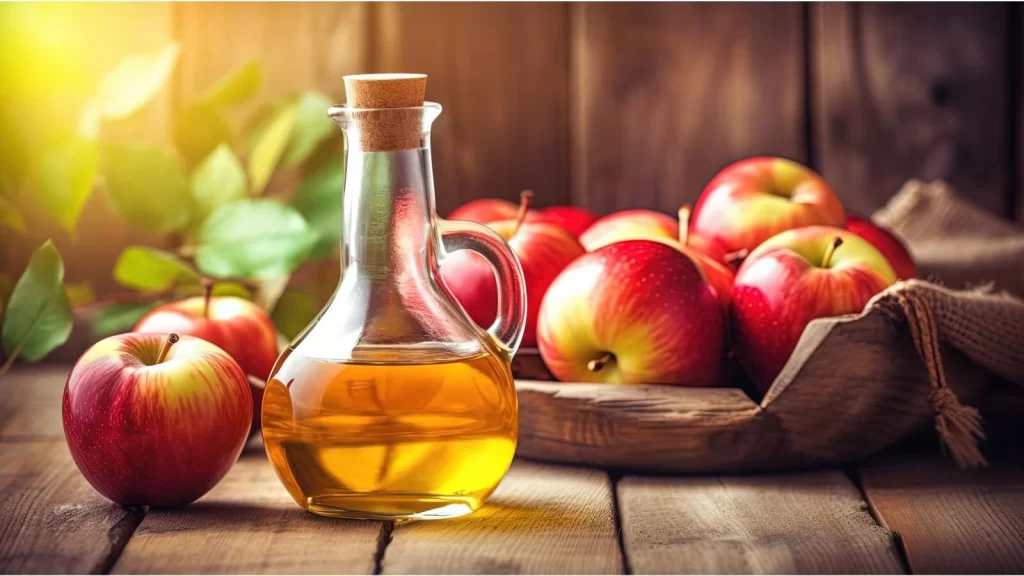Unfiltered Apple Cider Vinegar: Nature’s Golden Elixir
Apple cider vinegar (ACV) has enjoyed a resurgence in popularity in recent years, with claims of numerous health benefits and culinary uses. While traditional, filtered ACV has been a staple in kitchens for centuries, unfiltered apple cider vinegar is gaining traction for its potential to offer even more health advantages and unique flavors.
In this article, we’ll explore the wonders of unfiltered apple cider vinegar, its composition, benefits, culinary applications, and some precautions to consider.
What is Unfiltered Apple Cider Vinegar?
Unfiltered apple cider vinegar, often referred to as “raw” or “with the mother,” is made through a two-step fermentation process. Apples are first crushed and their liquid is extracted. This liquid, which is rich in natural sugars, is then fermented by yeast to convert the sugars into alcohol. In the second step, acetic acid bacteria further ferment the alcohol into acetic acid, which gives vinegar its characteristic sour taste.
What sets unfiltered apple cider vinegar apart from its filtered counterpart is that it retains the “mother.” The mother is a colony of beneficial bacteria and enzymes, including acetic acid bacteria, yeast, and strands of proteins.
This cloudy, murky substance often sinks to the bottom of the bottle, giving unfiltered ACV its distinctive appearance. These components are the key to many of its purported health benefits.
The Composition of Unfiltered Apple Cider Vinegar
Unfiltered apple cider vinegar is a treasure trove of nutrients and bioactive compounds. Here’s a breakdown of its components:
Acetic Acid: This is the primary component responsible for vinegar’s tart flavor. Acetic acid also has potential health benefits, such as aiding digestion and promoting a feeling of fullness.
The Mother: This cloudy, stringy substance is rich in beneficial bacteria (probiotics) and enzymes. These microorganisms play a vital role in the fermentation process and can contribute to gut health.
Polyphenols: These antioxidants are known for their ability to combat oxidative stress and inflammation, potentially reducing the risk of chronic diseases.
Minerals: Unfiltered ACV contains small amounts of minerals like potassium, magnesium, and phosphorus.
Pectin: A type of soluble fiber that can help regulate blood sugar levels and support heart health.
B-Vitamins: These water-soluble vitamins, including B1, B2, and B6, are important for energy metabolism and overall health.
Health Benefits of Unfiltered Apple Cider Vinegar?
While more research is needed to confirm many of the health claims associated with unfiltered ACV, several potential benefits have been suggested:
1. Weight Management
Some studies suggest that apple cider vinegar may help with weight loss by promoting a feeling of fullness and reducing calorie intake.

2. Blood Sugar Control
ACV may improve insulin sensitivity and lower blood sugar levels, making it potentially beneficial for people with type 2 diabetes.
3. Digestive Health
The probiotics and enzymes in unfiltered ACV may aid digestion and improve gut health. It could alleviate symptoms of indigestion and bloating.
4. Antioxidant Properties
The polyphenols in ACV may combat oxidative stress, reducing the risk of chronic diseases.
5. Cholesterol Reduction
There is some evidence to suggest that ACV might help lower LDL (bad) cholesterol levels.
6. Skin and Hair Care
Diluted ACV can be used topically for skin and hair care. It may improve skin complexion, balance pH, and add shine to hair.

Culinary Uses of Unfiltered Apple Cider Vinegar
Beyond its potential health benefits, unfiltered apple cider vinegar is a versatile ingredient in the kitchen. Here are some creative ways to incorporate it into your culinary repertoire:
1. Salad Dressings
ACV adds a delightful tang to vinaigrettes and dressings. Mix it with olive oil, honey, and Dijon mustard for a classic salad dressing.
2. Pickling
Unfiltered ACV is ideal for pickling vegetables, from cucumbers to red onions, adding a punch of flavor and preserving your produce.
3. Marinades
Tenderize meats and infuse them with flavor by using ACV in marinades. It’s particularly delicious with chicken and pork.
4. Beverages
Some people enjoy a daily ACV shot or incorporate it into their morning routine with warm water and honey for a healthful start to the day.
5. Baking
You can use ACV as a leavening agent in vegan baking. When combined with baking soda, it produces carbon dioxide gas, which helps dough rise.
Precautions and Side Effects
While unfiltered apple cider vinegar offers numerous potential benefits, it’s essential to use it with caution and be aware of potential side effects:
1. Tooth Enamel Damage
ACV is acidic and may erode tooth enamel. Always dilute it when consuming and consider using a straw to minimize contact with teeth.
2. Digestive Discomfort
In some cases, ACV may cause gastrointestinal discomfort, including nausea and indigestion. Start with small amounts to see how your body responds.
3. Medication Interactions
If you take medications for diabetes or blood pressure, consult your healthcare provider before adding ACV to your routine, as it may interact with these medications.
4. Skin Sensitivity
Undiluted ACV can cause skin irritation. Always dilute it when using it topically.
Allergies:
While rare, some individuals may be allergic to apples and could experience allergic reactions.
Does apple cider vinegar expire?
Apple cider vinegar does not expire in the traditional sense, as it has a very long shelf life. Its acidity and low pH make it highly resistant to spoilage. Over time, it may undergo some cosmetic changes, such as cloudiness or sedimentation, but it remains safe to use. To ensure its quality, store it in a cool, dark place and keep the cap tightly sealed.
Selecting and Storing Unfiltered Apple Cider Vinegar
When choosing unfiltered apple cider vinegar, opt for high-quality, organic brands that clearly state “with the mother” on the label. It’s important to select a product that hasn’t been excessively processed or pasteurized, as this could destroy the beneficial microorganisms.
Store your ACV in a cool, dark place away from direct sunlight. The mother may settle at the bottom of the bottle, so it’s a good idea to shake it before each use to distribute the components evenly.
Conclusion
Unfiltered apple cider vinegar, with its rich composition of acetic acid, the mother, and a range of beneficial compounds, offers a potential array of health benefits and culinary applications. From aiding in weight management and blood sugar control to its versatility in the kitchen, ACV has certainly earned its reputation as “nature’s golden elixir.”
However, it’s important to use it wisely, considering possible side effects and consulting with a healthcare provider when necessary. Whether you choose to incorporate it into your daily routine or your favorite recipes, unfiltered apple cider vinegar can be a valuable addition to a healthy and flavorful lifestyle.








































